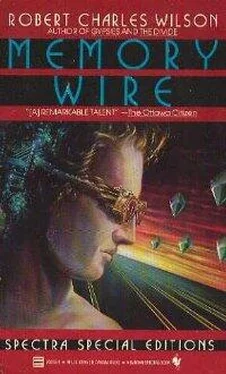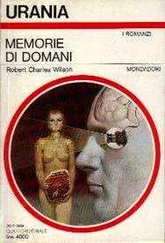Robert Wilson - Memory Wire
Здесь есть возможность читать онлайн «Robert Wilson - Memory Wire» весь текст электронной книги совершенно бесплатно (целиком полную версию без сокращений). В некоторых случаях можно слушать аудио, скачать через торрент в формате fb2 и присутствует краткое содержание. Год выпуска: 1987, ISBN: 1987, Издательство: Bantam Spectra, Жанр: Фантастика и фэнтези, на английском языке. Описание произведения, (предисловие) а так же отзывы посетителей доступны на портале библиотеки ЛибКат.
- Название:Memory Wire
- Автор:
- Издательство:Bantam Spectra
- Жанр:
- Год:1987
- ISBN:978-0-553-26853-9
- Рейтинг книги:4 / 5. Голосов: 1
-
Избранное:Добавить в избранное
- Отзывы:
-
Ваша оценка:
- 80
- 1
- 2
- 3
- 4
- 5
Memory Wire: краткое содержание, описание и аннотация
Предлагаем к чтению аннотацию, описание, краткое содержание или предисловие (зависит от того, что написал сам автор книги «Memory Wire»). Если вы не нашли необходимую информацию о книге — напишите в комментариях, мы постараемся отыскать её.
Memory Wire — читать онлайн бесплатно полную книгу (весь текст) целиком
Ниже представлен текст книги, разбитый по страницам. Система сохранения места последней прочитанной страницы, позволяет с удобством читать онлайн бесплатно книгу «Memory Wire», без необходимости каждый раз заново искать на чём Вы остановились. Поставьте закладку, и сможете в любой момент перейти на страницу, на которой закончили чтение.
Интервал:
Закладка:
“I can bring in a doctor,” Byron said.
She shrugged. She was dying, she was resigned to it, she told Byron so… but even as she spoke, she felt a new reluctance welling up. “I want to do the ’lith again,” she said.
“Then let me bring a doctor. And some food.” He looked around. “And maybe clean this place up a little. Christ, it’s a pit.”
She agreed.
Withdrawal was agony. The doctor Byron brought was a refugee MD who shot her up with vitamin supplements and charted her neuropeptides on a hand monitor. When the ordeal was finished, Byron coaxed her to eat again.
Health came as a shock. The world took on brighter hues; food tasted better. She began to work again. With some money coming in, she found a place nearer to Byron. She began taking long walks out to the tidal dams to watch the weather sweep in from the sea. She had not stopped wanting the pills—the doctor had said it was a craving she might never lose, burned too deeply now into her neurochemistry—but the dreamstones seemed to take away the edge of the need. She did not understand much of what she saw in her stone trances but she attempted to incorporate it into her work; she did the first of her crystal paintings, a bright Exotic landscape.
She was aware, too, that Byron had fallen in love with her… aware that she did not love him.
For a time she tried. She moved in with him; they made love with dedication if not passion. But it was a failed experiment and they both knew it. He wanted her, he said, but he didn’t want her as payment.
It made her feel cold. She tried to reassure herself— and maybe stake out some independence—by taking other lovers among the artists she knew, but the effort was finally unsatisfying. Maybe, she thought, she had lost the capacity for love; maybe it had been burned out in her addiction.
Her obsession with the oneiroliths deepened. Byron introduced her to Cruz Wexler, the academic who had written two books about the ’liths and who ran a kind of outlaw academy on his threadbare estate in Carmel. Wexler, a middle-aged man with guileless features and a progressive and untreatable emphysema, was enthusiastic about her artwork; he had agented some of it to his wealthy friends. So she had money again. She refurbished her studio in the Floats; she invested in tools she had never been able to afford.
And when a new unease began to overtake her—a sense that she had gone as far into the ’liths as she could go, and was still lost here, incomplete, on the margin of her own life—it was Cruz Wexler who hinted at the existence of a new kind of ’lith, a deep core ’lith, a ’lith that might answer her questions.
The eagerness she felt was almost physical. “Can I get one?”
He smiled. “None of us can get one. I’ve talked to people in the research compounds. The lid is down very tight.”
It was a huge disappointment. The stones Byron grew, for all their strange access to the past, had not resolved the mystery of her early childhood. She had occasionally glimpsed the fire—a chaos of smoke and flame—but nothing of herself; she did not know where she was born or when or who her parents were. The memories, Wexler said, were too deeply suppressed. And she had come increasingly to believe that the thing she wanted was hidden in that darkness: a well from which she might draw out a shining key and unlock herself, become a new thing altogether.
A month later Wexler told her he had set up a purchase, not here or in the Orient but in Brazil, Pau Seco, the mine itself. It was an unorthodox and expensive move but it would be worth it, he said: the new stone would yield up answers, secret wisdom—she felt a little of his own flagging enthusiasm—the final gnosis. All he needed was a courier, someone without a criminal record, someone not too closely connected with him.
Byron was appalled when she volunteered. “You don’t know anything about it… Christ, what were you thinking of?”
“You don’t understand. I need to go.” They were walking down a market canal after hours, the boat stalls locked under their awnings, salt glittering along the boardwalk under a string of sodium vapor lights. She took his hands, knowing in that moment that he was authentically frightened for her; that his curious, lopsided love was as alive as it had ever been. “It matters that much. It’s not something I can let alone.”
“I’ll go with you,” he said.
She agreed, because he knew the country, because his intuition might have been correct: it might not be as easy as Wexler had promised. And she consented when he chose to bring along the Network Angel, Raymond Keller, also a veteran. But that was all the concession she would make. And so they had come here.
She was a window away from Pau Seco. She could smell it. She could feel it—the nearness of that ancient artifact, star-stone; its scattered fragments. But the mine was a vast and ugly place, and it had shattered all her certainties. She had risked her life, she thought grimly— and Byron’s, and Keller’s—because of a voice in her head. Because of a dream.
Because she was lost. Because she had been lost for years… lost for most of her life.
She was afraid to go to sleep. Thinking about the tiny black pills, the synthetic enkephalins, had stirred an old longing in her. If I had one now, she thought—it was a dangerous, traitorous thought—I would take it.
She stared through the window at the starless sky, willing the dawn to come.
CHAPTER 9
Stephen Oberg was dismayed when he met the man in charge of the military presence at Pau Seco: a huge back-country Brazilian with dark eyes and an obviously strong sense of territoriality. The man introduced himself as Major Andreazza and offered Oberg a painfully narrow cane-backed chair. His office overlooked the broad canyon of the mine; Andreazza himself occupied a plush swivel chair behind a sumptuous desk. “Thank you,” Oberg said.
Andreazza regarded Oberg at great length and said, “You must tell me why you came here.”
And so, laboriously, he explained it again. The Pacific Rim powers were very anxious, he said, that the deep-core oneiroliths should not fall into unauthorized hands. To this end security had been tightened up at the research facilities in Virginia, in Kyoto, and in Seoul. However, an informant close to the American cultist Cruz Wexler had tipped off the Agencies to a purchase that had been arranged here, at Pau Seco. Oberg had come to interdict it.
Andreazza turned his chair to face the window. “We put a considerable effort into security ourselves,” he said.
“I know.” With guns, Oberg thought, intimidation, the making of public examples. There had been hangings at Pau Seco as recently as last year. “I understand,” he said. “Still”—treading carefully—“the process isn’t airtight.”
Andreazza shrugged. “The formigas are frisked every night as they leave. We have informants in the labor compounds. I fail to see what more we can do.”
“I’m not here to criticize your efforts, Major. I’m sure” they’re exemplary. All I want to do is to locate three Americans.” He opened his briefcase, withdrew the photographs he had obtained from the SUDAM official, and passed them across Andreazza’s desk.
Andreazza gave them a cursory glance. “If they’re here,” he said, “I don’t suppose they look so clean anymore.”
“We know they have a contact in the old town,” Oberg persisted. “A man who may be sheltering them.”
“The mine we control,” Andreazza said. “The compounds, yes. But don’t overestimate us, Mr. Oberg. There are a quarter of a million peasants who live outside the fence. The old town is an anarchy. Without at least a name, there is a limit to what we can accomplish.”
Читать дальшеИнтервал:
Закладка:
Похожие книги на «Memory Wire»
Представляем Вашему вниманию похожие книги на «Memory Wire» списком для выбора. Мы отобрали схожую по названию и смыслу литературу в надежде предоставить читателям больше вариантов отыскать новые, интересные, ещё непрочитанные произведения.
Обсуждение, отзывы о книге «Memory Wire» и просто собственные мнения читателей. Оставьте ваши комментарии, напишите, что Вы думаете о произведении, его смысле или главных героях. Укажите что конкретно понравилось, а что нет, и почему Вы так считаете.












